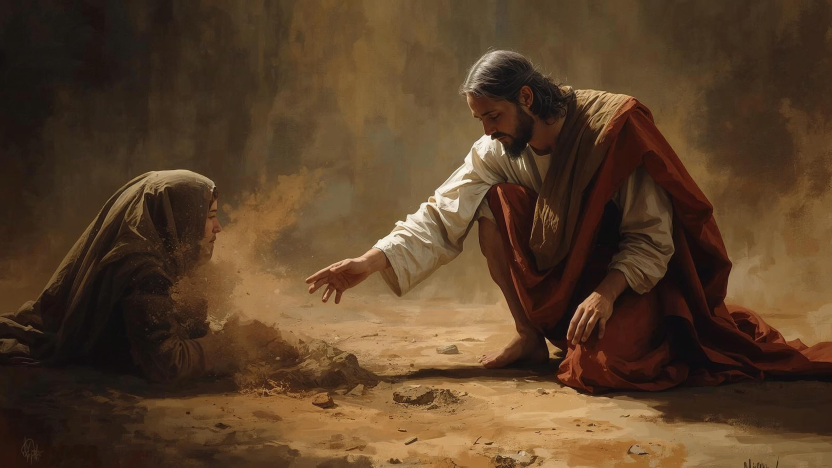"Come, see a Man....Could this be the Christ?"
John 4:29
As Jesus began His ministry, He not only preached love for enemies, He acted it. In John chapter 4, the apostle states that Jesus left Judea to return to Galilee. On His way, He entered the territory of the Samaritans, a hated offshoot of Judaism who bitterly disputed the Jews' religious practices and sites of worship. But Jesus did not share the Jews' hatred. When the Savior encountered a Samaritan woman at a well, He took the opportunity to demonstrate His universal love. Jesus did this by enacting a particular type of Old Testament scene, following a pattern that both Jews and Samaritans would have understood. In so doing, Jesus acted out a prophecy, a prophecy that showed Christ’s ultimate desire to re-unite with humanity.
The Old Testament contains several encounters at a well, most notably the encounters between Abraham's servant and Rebecca (Genesis 24:11–33), Jacob and Rachel (Genesis 29:2–15), and Moses and Zipporah (Exodus 2:15–21). These three well-side meetings bear many similarities to each other. In each one, a man ventures into a foreign country where he meets a woman at a well which results in a marriage, someone hurries from one place to another, and the man is invited to a feast to celebrate. These common elements recur so often that secular scholars attribute them to scribal copying, but as Robert Alter points out in The Art of Biblical Narrative, each of these scenes also bears distinct differences from the others, and it is the differences that grab readers' attention and foreshadow the story to come.
Unlike the stories of Jacob and Moses, when Isaac requires a wife, he does not go in person but sends a servant. At the well, Rebecca is a whirlwind of activity, and when her brother sees the gifts she's received, his greed is obvious. Laban's greed will come up again, as will Rebecca's whirlwind when she hurries to deceive Isaac. Isaac's total absence from the well scene also magnifies his passivity as a patriarch. As a boy, he was prepared as a sacrifice by his father, and as an old man, he was tricked by his son. Isaac's well-scene shows that Isaac does not drive events, events happen to him.
The story of Jacob, however, shows a much more willful character. When he encounters Rachel at a well, the well is blocked by a heavy stone, and Jacob physically wrestles the stone off the well and waters Rachel's sheep. Unlike Rebecca at the well, now it is the man who exerts himself, a fitting image of a man who will give 14 years of labor to marry the girl he has just met.
In contrast to both of these stories, the account of Moses and Zipporah is brief and impersonal. After Moses drives off desert raiders in defense of seven unnamed girls, it is the girls' father who has to send them back to retrieve Moses, and Moses is given one of the daughters, named only at the end of the story. The telling is so concise (only seven verses) that the reader knows not to expect the starry-eyed romance of Jacob and Rachel.
Now, in John 4, note how Jesus followed the same pattern as these Old Testament stories. Like Abraham's servant, Jacob, and Moses, Jesus too ventured into a foreign country, the land of the Samaritans. At a well, he encountered an unmarried woman, and though Jesus did not propose as His forebears did, He did bring up the subject of marriage in their conversation. After their dialogue, the woman hurried home, just as Rebecca had once done, and when the disciples come and urge Jesus to eat, He reports that He has already had a feast. John's account faithfully reproduces each of the elements common to the well-side scenes of Genesis and Exodus. Whether those elements are present due to Jesus's deliberate actions or John's careful retelling is hard to say, but whoever is responsible, God's Word clearly draws the connection between Jesus's encounter with the woman that day and Old Testament betrothal stories. To see that connection allows us to see the scene not only from a literary perspective, but also from a prophetic one.
The story of Christ the Messiah follows a very similar pattern.
The Son of God, dwelling in heaven, left it to venture into the foreign land of this world. Here He found His bride-to-be, His people. From the presence of Jesus, the disciples hurried away, taking His words into all lands. Christ even gave us a celebratory feast, His body to eat and blood to drink. But there are also differences from the ancient pattern. Like the Samaritan woman, God's people have been married before, distracted by many alternate gods. Possibly we are living unfaithfully. Before there can be a marriage to our Savior, our lives must be changed.
Call to Action
Today the Christian's mission is to exemplify Christ before the world, to say to everyone we meet the same words said by the Samaritan woman, "Come, see a Man....Could this be the Christ?" (John 4:29). Just as Christ's prophesy that day was not only in His words but also His actions, how can you embody God's message not only in what you say but in what you do? How can you show every passerby your encounter with the Messiah? Is there a neighbor you can help? A friend you can encourage? Someone sick you can serve? Whoever they are, you may be tempted to think of them as an enemy, but by the power of the Holy Spirit, you will see them for what God made them to be: a member of His family.
Unless noted otherwise, scripture taken from the New King James Version®. Copyright © 1982 by Thomas Nelson. Used by permission. All rights reserved.




